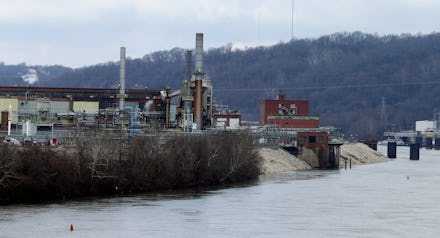There Was a 2nd Chemical Spilled In West Virginia That We Didn't Know About

The news: The situation in West Virginia keeps getting worse. Not only were 300,000 people still without clean tap water, but also it has now come out that there was a second chemical leaked in the original spill — but the company waited until now to disclose it.
The Charleston Gazette reported earlier this week that along with the crude MCHM that leaked into West Virginia’s water supply was a chemical substance known as PPH, but Freedom Industries waited until Tuesday, January 21 to disclose that information to regulators because it considered PPH "proprietary," meaning it didn’t want to reveal the makeup of the compound. As Paul Barrett in BusinessWeek puts it, Freedom Industries waited almost two weeks to tell federal regulators about the PPH spill because it wanted "to protect trade secrets about its polyglycol recipe."
Yes, that’s how much this company sucks: one of its cofounders was once charged with tax evasion, it filed chapter 11 bankruptcy and thus has a good shot of avoiding any civil suits arising from the spill, and now it comes out that it waited nearly two weeks to disclose the full extent of the spill. Freedom Industries is a real stand-up operation.
At least, according to the New York Times, PPH "appears to be somewhat less toxic than MCHM" and was only a small part of the total spill. But "somewhat less toxic" isn’t all that encouraging to hear for the 300,000 people who had their water supply cut off.
There’s always the possibility that the water in West Virginia has never been safe to drink, of course. If you talk to former mine workers in the area, they’ll tell you that they never drank the water: "I watched the coal industry poison our water for years … I haven’t drank the water here in years, and I suggest you do the same," Joe Stanley told Business Insider.
So maybe chemical leaks in West Virginia's water supply are nothing new. But for Freedom Industries, hesitating to disclose all the information on a leak that shut off water for 300,000 people certainly doesn't look good.